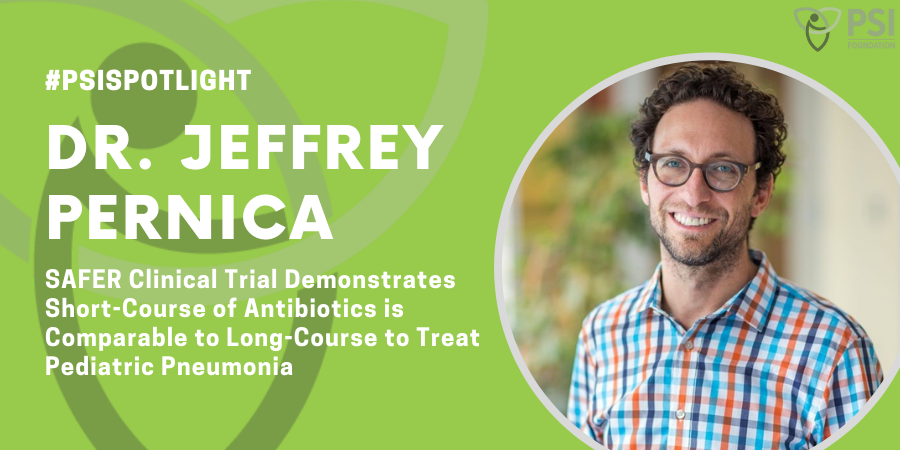A recent clinical trial, supported in part by PSI Foundation, is challenging the dogma around antibiotic use to treat community-acquired pneumonia in children.
Physicians have traditionally prescribed a 10-day course of antibiotics, but this has been based more on convention rather than evidence. Dr. Jeffrey Pernica, a pediatrician and infectious diseases specialist at McMaster Children’s Hospital, recently led a clinical trial to determine whether a five-day course of antibiotics is as effective as the longer course.
“As medicine has transitioned to relying more on evidence rather than convention, we’re all trying to be more rational with antibiotic courses in order to make patient management plans that carry the most potential benefit and the least potential harm,” says Dr. Pernica. “As physicians, we all have a responsibility to make sure that when we use antibiotics, the courses we select are based on the best evidence so that our patients receive just the amount of antibiotics that they require – and no more.”
Potential antibiotic-associated harms include increasing rates of circulating antibiotic-resistant bacteria, medication costs to the families, short-term side effects, as well as longer-term health effects from disrupting the microbiome, including obesity and allergic disease.
Dr. Pernica first led a pilot study comparing a 10-day course of amoxicillin to a five-day course of amoxicillin for community-acquired pneumonia as part of his master’s degree in health research methodology. Based on the pilot study’s results, he received a PSI Foundation Clinical Research Grant in 2015 to expand the study and launch the SAFER (Short-Course Antimicrobial Therapy for Pediatric Respiratory Infections) trial.
“PSI feels like a collegial organization, and the grant reviewers are really my peers,” says Dr. Pernica. “They have the best interests of Ontarians at heart and a good idea of what studies are actually going to be useful for Ontario citizens, academics and clinicians.”
With PSI support, Dr. Pernica and his team recruited 281 children from six months to 10 years old who were diagnosed with pneumonia in the emergency departments at McMaster Children’s Hospital and the Children’s Hospital of Eastern Ontario. The children received either the full 10-day course of antibiotics or five days of antibiotics and five days of placebo and were followed closely until they were assessed two to three weeks after diagnosis.
The trial results, published in JAMA Pediatrics in March 2021, demonstrate that the short course of antibiotics was comparable to the standard course in treating children with community-acquired pneumonia. At 14 to 21 days after enrollment, 85.7% of children on the short course of antibiotics were “clinically cured” based on the study’s strict definition, compared to 84.1% of children on the longer course. The researchers then did a post hoc analysis to examine how many of the children clinically improved without needing additional antibacterials: 93.5% of children on the short course and 90.4% on the longer course fit this criteria. Taken together, the results suggest that the short course of antibiotics is just as effective as the longer.
Dr. Pernica says the trial did not require any special tests for physicians to order or onerous follow-up for patients, reflecting real-world conditions of how pneumonia in children is diagnosed and treated, which should allow the results to be quickly integrated into practice.
“The patients in this study are very similar to patients that doctors see every day in Canadian emergency departments and diagnose with pneumonia,” says Dr. Pernica. “For that reason, we think that this evidence is generalizable to the vast majority of children being diagnosed with pneumonia in Ontario emergency departments and will be of practical use for Ontario-based physicians.”
Given the urgency and scale of the challenge of antibiotic resistance, Dr. Pernica and his team are now focused on knowledge translation to incorporate the results into prescribing practices. They are working with research groups such as Pediatric Emergency Research Canada to integrate the results into practice and reduce antibiotic use where possible.
“Antibiotic resistance has become so important, not just in other places in the world, but here in Canada as well. We all need to do our part to use antibiotics responsibly so that we are still able to control bacterial infections in our population,” says Dr. Pernica. “It’s going to be critical to make sure that clinicians in Canada use only as much antibiotics that are needed to cure a patient, but no more.”

